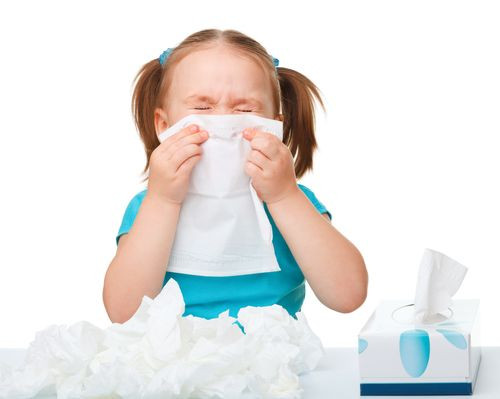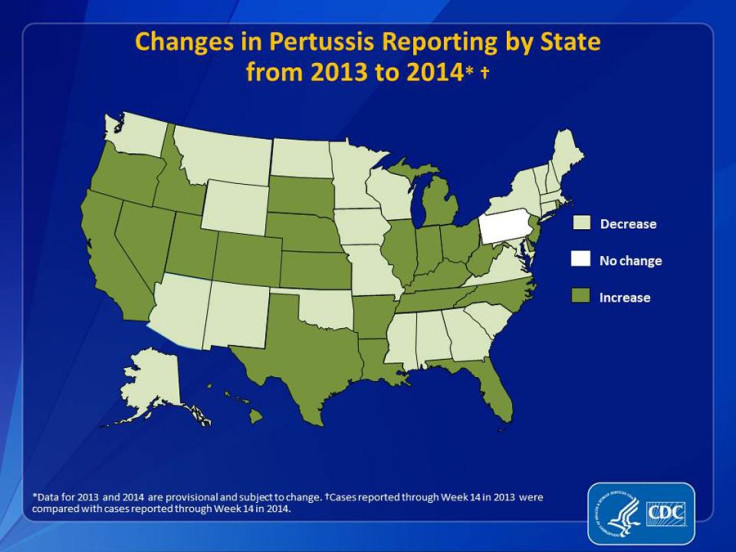Whooping Cough Ain't Much Fun: 3 Easy Ways To Prevent The Spread Of The Bacterial Disease

If you have a runny nose, a mild fever, and a dry cough, chances are you have the common cold, but when the persistent hacking cough continues for two weeks, you will most likely be diagnosed with pertussis, or "whooping cough."
There have been recent outbreaks throughout the country, specifically in California, where the number of whooping cough cases has coincided with the steady rise of parents who have opted out of vaccination requirements for their kids. The 2014 pertussis outbreak in San Diego has been comparable to 2010 — the worst year in whooping cough cases reaching 1,179 — while this year’s tally is up to 266, according to KPBS.
"We are seeing a level of pertussis activity that should cause concern for parents and caregivers,'' said Dr. Wilma Wooten, county public health officer to KPBS. “We want everyone to receive the recommended vaccines so that they are protecting themselves as well as everyone around them.'' Health officials say pertussis levels are rising.
There has been a total of 4,838 cases of pertussis reported by the city of San Diego, along with 48 states and Washington, D.C., according to the Centers for Disease Control and Prevention (CDC), which represents a 24-percent increase compared to the same time in 2013. Last year, a total of 24,231 cases of whooping cough were reported to the CDC, with increased rates observed in teens 13 and 14 years of age. However, this year, health officials are expecting a greater number of children to be affected, due to parents’ personal beliefs in delaying vaccinations.

The highly contagious bacterial infection is characterized by symptoms of a runny nose, sneezing, mild cough, and low-grade fever, but after two weeks, the irritating cough turns into coughing spells. During these spells, which can last for more than a minute, the child may turn red or people, says KidsHealth. A child may begin to make a whooping sound when breathing in, or they may vomit after the spell. The most common complication of whooping cough is secondary bacterial pneumonia.
Currently, the CDC recommends that children get doses of the vaccine at the following ages: two months, four months, six months, 15 to 18 months, and four to six years. Preteens and adults are advised to get a booster shot, Tdap, for whooping cough as a means to reduce their risk of infection. Although adolescents may have received the vaccine, immunity from DTaP — the pertussis vaccine — tends to wane by age 11, says the Mayo Clinic. Pregnant women should receive a dose of Tdap during each pregnancy in order to maximize the protective antibodies passed to the baby.
The most vulnerable group for risk of infection includes infants younger than 1 year old because they do not have the full five-dose series of pertussis vaccinations. Babies are not vaccinated for whooping cough until they are 2 months old. Therefore, it is up to adults to stay up-to-date with their immunizations because they can easily transmit the disease to under-immunized infants. Until an infant receives the first three pertussis immunization, they will be susceptible to the bacterial infection that could kill them. The majority of pertussis-related deaths occur among infants younger than 3 months of age.
If a baby catches whooping cough, they will experience trouble breathing, pneumonia, and in some cases, brain damage or death. Therefore, to keep your baby safe, you will need to protect yourself and your whole family, especially since the pertussis vaccines do not completely cancel out the possibility of getting whooping cough. Here are three easy ways to prevent one of the most common childhood diseases in the U.S.:
3 Ways to Naturally Prevent Whooping Cough
The first line of therapy is to get vaccinated, but since the effects of the pertussis shot tend to wane, it’s important to step up your line of defense with a few daily habits.
1. Take vitamin C
Vitamin C in high doses will help you and your child as they develop a lasting immunity to pertussis. The International Medical Council on Vaccination says most parents report a significant decrease in cough severity within the first 24 hours of proper oral doses. This is because vitamin C addresses the issue of toxin neutralization.
2. Take probiotics
Probiotics can help strengthen a child’s immune system, and it’s the easiest way to ensure that the body contains “healthy” bacteria. High quality probiotics come in different forms, from fruity chewables to coated capsules for adults. The presence of good bacteria is good for you and your family’s health.
3. Stay hydrated and get rest
It’s important to replenish the body with plenty of H2O, to rid the body of toxins and to keep your organs functioning. For the body to fight infection, it needs an adequate amount of water. The spread of whooping cough can attack those with the most vulnerable immune systems, including the young and elderly. Getting the recommended amount of rest will also help you feel good and let your body revitalize itself.



























